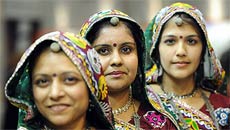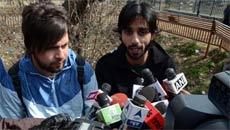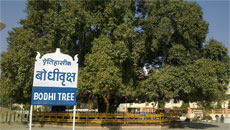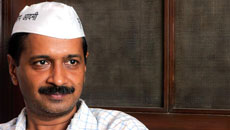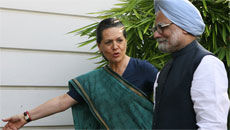Next month's general elections may prove to be the most significant ever because they can determine the fate of the Congress' first family. It is open to question whether in the event of the party's defeat, as is anticipated, the Nehru-Gandhi dynasty can continue to play its present dominant role.
True, the family has survived other setbacks, notably in 1977 and in 1989. But it had the advantage in those days of being headed by charismatic leaders. That was the reason the Congress survived the crushing blows it received in 1977 to return to power in 1980 by raising its tally of Lok Sabha seats from 153 to 353. Four years later, its tally went up to 415 under another popular leader, Rajiv Gandhi.
This time, however, the party cannot claim that it is led by widely acclaimed leaders. Neither Sonia Gandhi nor Rahul Gandhi have the appeal and commanding personality of Indira Gandhi, or the charm and modern outlook of Rajiv Gandhi till he was tarred by the Bofors howitzer scandal.
There is another disadvantage for the Congress this time. Its 1977 defeat was at the hands of a hastily assembled group of parties ranging from disgruntled Congressmen like Morarji Desai, angry over Indira Gandhi's rise in the party, to the Jana Sangh (now BJP) which merged with the newly-formed Janata Party.
Moreover, the latter's inability to provide a semblance of effective governance revived Indira Gandhi's image even as the popular anger against her emergency rule of 1975-77 subsided. In 1984, a sympathy wave over her assassination, coupled with Rajiv Gandhi's Mr. Clean image, helped the Congress.
No such extraordinary circumstances - suppression of civil rights or a tragic death - exist now. Instead, a replay of the Bofors scam on a far wider scale along with economic slowdown has eroded the Congress' standing.
If the party had leaders who were in sync with an aspirational India, the scene might have been different. But Sonia Gandhi does not seem to have outgrown the years when she lived as a young bride in Indira Gandhi's household.
The ideas which she imbibed from her formidable mother-in-law - socialism as an ideology and cynicism as policy - continue to influence her. Not only that, she has passed them on to Rahul Gandhi, who may be well-meaning and compassionate, as Finance Minister P. Chidambaram said on television, but not particularly politically astute or with economic insight.

The result is that mother and son are unable to comprehend that the country has changed since 1991 because of the opening up of the economy. The common people are no longer enamoured of official sops and subsidies. Instead, they look to economic growth and increased opportunities for their livelihood.
In the event of a setback, therefore, the dynasty's flawed understanding of the political scene is bound to be questioned. But the jury is out on whether Congressmen, so long dependent on the family for guidance, will find the courage to break free.
However, there is a silver lining for the Congress. It is the scene reminiscent of 1977 and 1989 and also the period between 1996 and 1998, when there was no stable government at the centre.
Although the Bharatiya Janata Party's Narendra Modi is well ahead of Rahul Gandhi in the prime ministerial race, according the opinion polls, there is still no certainty that the BJP will be able to accomplish its "Mission 272-plus", as it highlighted at a recent convention.
It will be happy if it can reach the 182-mark which it did in 1998 and 1999, but there are doubts on this score. Even if, for argument's sake, the National Democratic Alliance (NDA) led by the BJP wins 200-odd seats, the party's chances of attracting allies from outside the NDA which can enable it to reach 272 are not very high.
So far the BJP has only been able to bring the Lok Janshakti Party to its side, but it is a poor compensation for the Janata Dal-United which left the NDA on the Modi issue. The group of minor Tamil Nadu parties which have joined the BJP cannot add much to the NDA's final tally.
Besides, L.K. Advani has reiterated his old reservations about Modi by saying that the party has become a one-man show while Sushma Swaraj, another of the earlier detractors, has been displeased with the wooing of what she calls tainted individuals.
Evidently, the scene is not as hunky-dory as the BJP may wish even if one ignores the surprising success of the Congress's student wing in the Gujarat university polls where it routed the BJP's affiliate.

If the BJP can only expect to be the largest party in the Lok Sabha with the NDA falling well short of the majority, the other challenger to the Congress, the so-called Third Front, may not be able to get off the ground at all. AlreadyTamil Nadu Chief Minister Jayalalithaa's ties with the Left parties have collapsed and the Janata Dal-United's Sharad Yadav has said that he has low expectations from the formation.
As in 1977 and 1989, the inability of the Congress opponents to get their acts together can boost the party's prospects for the next general election a year or two later.
